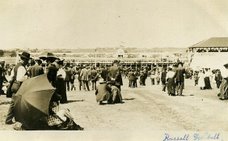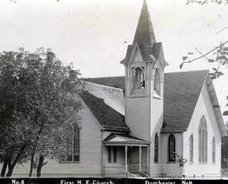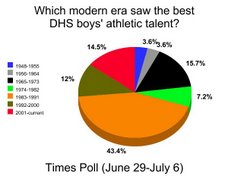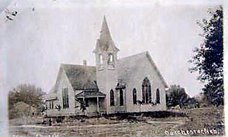
This Thursday, May 7, at 9:15 a.m., Nebraska Gov. Pete Ricketts will visit Dorchester and the Saline County Museum to memorialize the life and death of Private First Class Charley Havlat -- the last American G.I. killed in action in World War II's European Theater.
The event will mark the 70th anniversary to the conclusion of WWII in Europe.
Several sources have told the Times that Gov. Ricketts will issue a proclamation, declaring May 7 PFC Charley Havlat Day in Nebraska.
If you don't know the story of PFC Havlat, a Dorchester native, his tragic end seven decades ago represents the sacrifices made by an entire generation. His story needs to be remembered and retold.
***
Like thousands of other American men in the 1940s, Charles Havlat of Dorchester was sent overseas during WWII. Also like many others, PFC Havlat never made it back home, having made the ultimate sacrifice for his country.
But what makes PFC Havlat's story especially unique is that he is officially the last American soldier killed in action in the European Theater, after taking a bullet in the head while on patrol in southern Bohemia. He was shot by Nazi soldiers who were unaware that a ceasefire had been declared.
 At 34 years old, PFC Havlat was the oldest in his family to serve in WWII, along with brothers Adolph and Rudy Havlat.
At 34 years old, PFC Havlat was the oldest in his family to serve in WWII, along with brothers Adolph and Rudy Havlat. According to a 2005 story by Radio Praha (Czech Radio), PFC Havlat was on reconnaissance in a jeep on May 7, 1945, in Czechoslovakia, when his unit was blindsided by a "hail of enemy machine gun and small arms fire from concealed positions in the woods."
In an interview, his brother Adolph recalled that "Charley fired once at the enemy and then ducked" behind the hood of the his damaged jeep. "But he peeked back up, I guess, at the same position and they apparently had a bead right on him, so ... and he died instantly," Adolph said. "That's what I've been told, anyway."
 (Adolph Havlat plans to be at the May 7 ceremony with the governor, we are told.)
(Adolph Havlat plans to be at the May 7 ceremony with the governor, we are told.)PFC Havlat's fellow soldiers returned fire until the Germans' radio operator received word nine minutes that a cease-fire order and armistice were in effect. Taken captive, the German officer who led the ambush said he did not know that a cease-fire had been declared about six hours earlier and apologized for the incident.
The Havlat brothers were unaware of just how unlucky Charles had been until half a century later, according to the Radio Praha article. "We actually didn't hear about this until about 1995 -- that he was the last killed -- until it was published in the VFW magazine," Adolph said.
PFC Havlat is buried at the Saint Avold World War II Veteran's Cemetery near Metz, France. A military club in the Czech city of Plzen paid for a memorial plaque to be placed at the spot where he was killed.
***

For years, Adolph waged an unsuccessful campaign to get part of Highway 33, which his brother traveled often as a trucker, recognized as "The Charles Havlat Memorial Highway."
In 2008, the Dorchester American Legion, Post 264, made at least three requests to the State of Nebraska and the Department of Roads to name the small stretch of Highway 33 between Dorchester and Crete after PFC Havlat, but the request was denied.
So in 2010, the Dorchester Area Community Foundation along with the Dorchester Legion raised more than $5,000 for a state historical marker to pay tribute to PFC Havlat and his ultimate sacrifice.
The historical marker is located on the grounds of the Saline County Museum, just off the highway that Charley Havlat traveled so often before he wore the uniform of his nation.


















































Where is the meeting with the governor to take place?
ReplyDeleteWhats the reason that renaming a stretch of the highway was denied? Seems like that's very common everywhere else that a highway (or part of it) is renamed to honor a hero
ReplyDelete